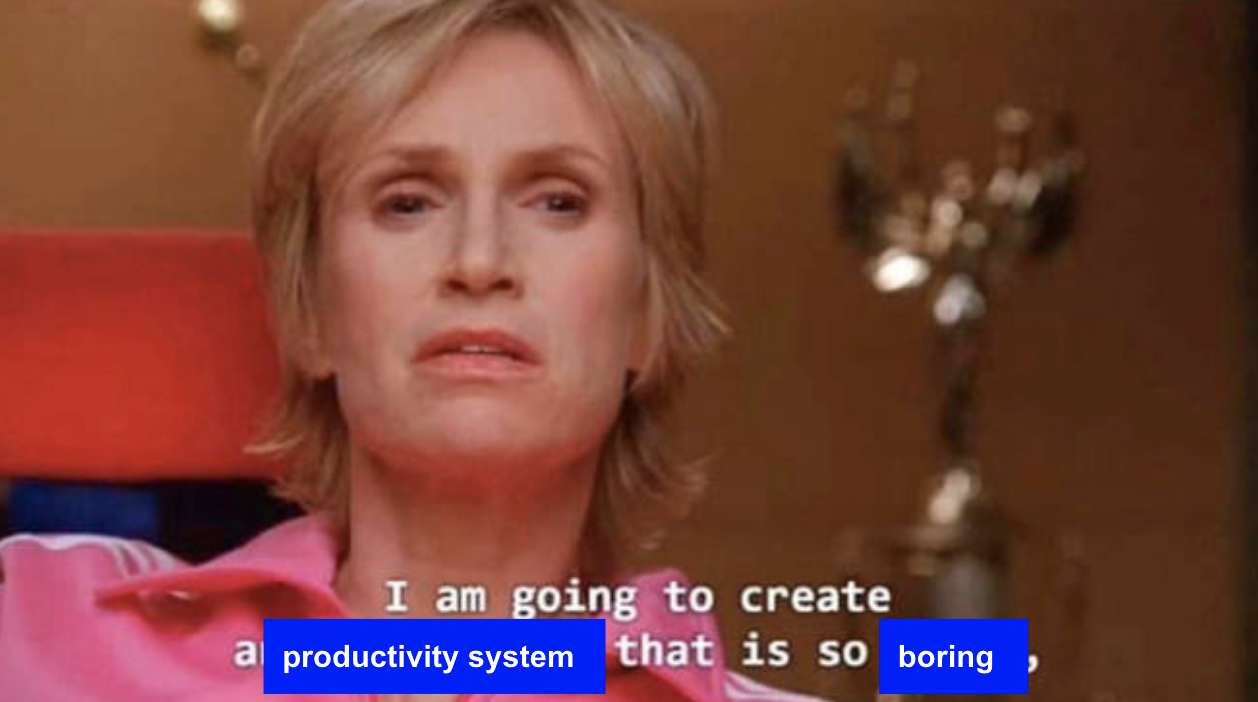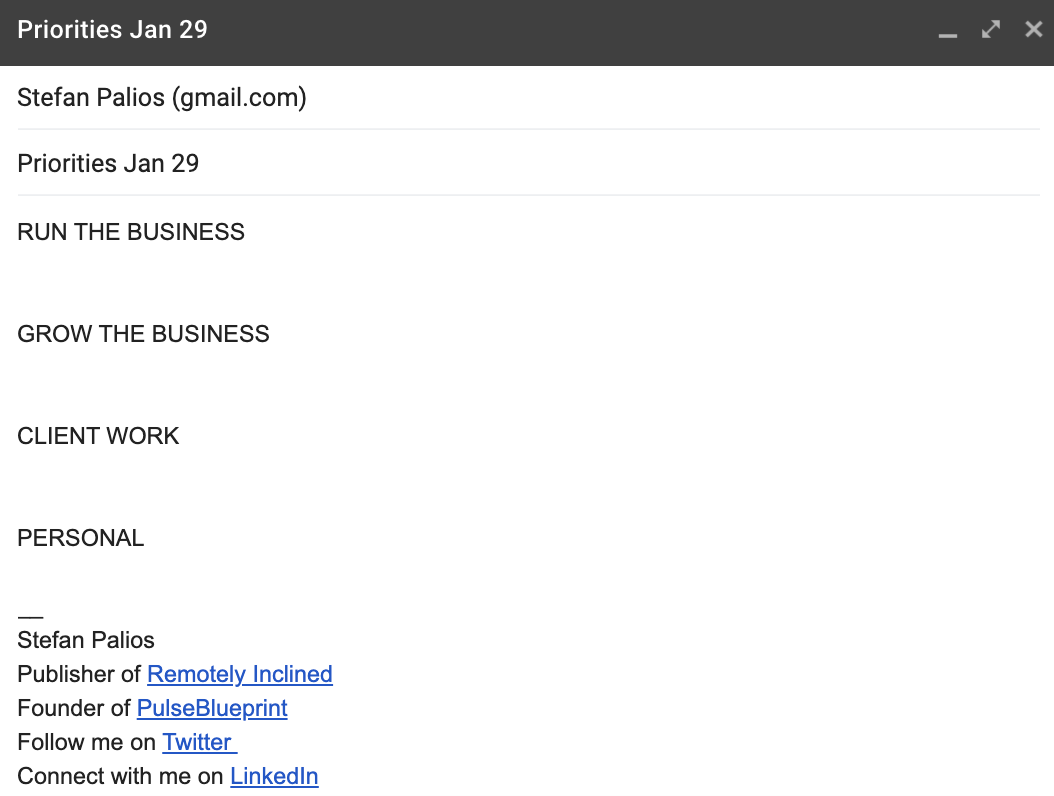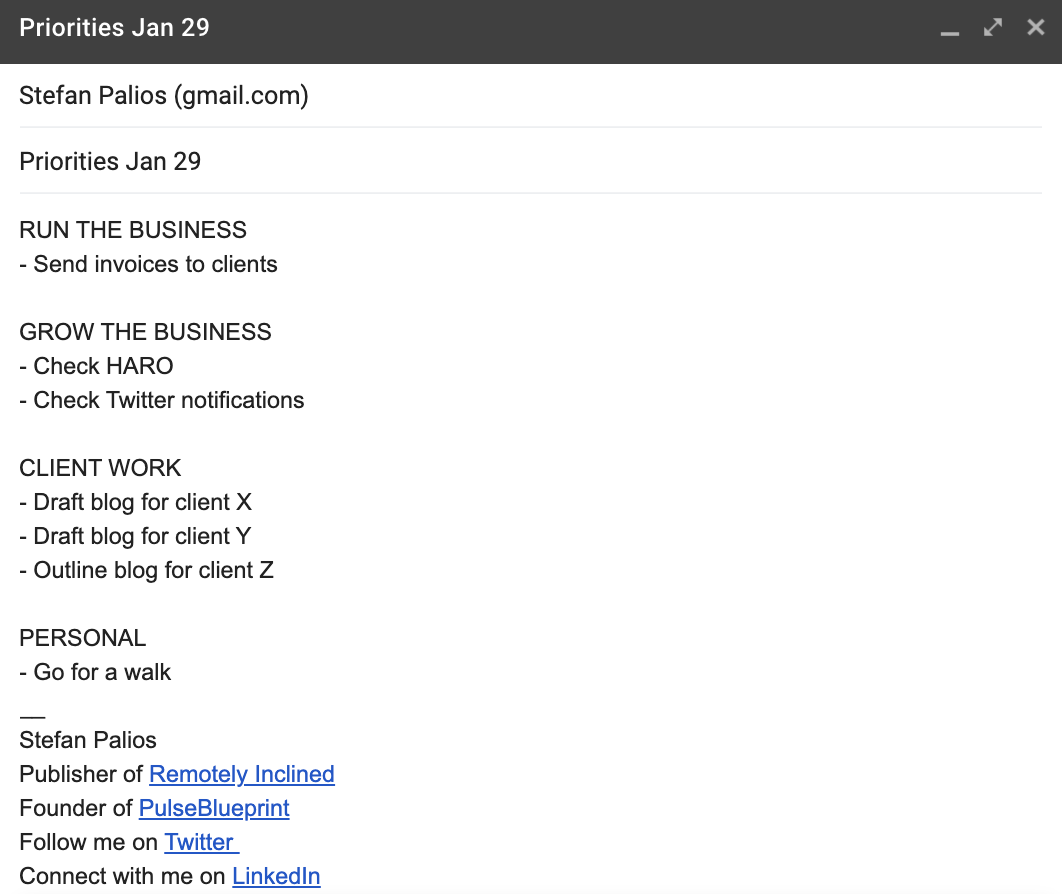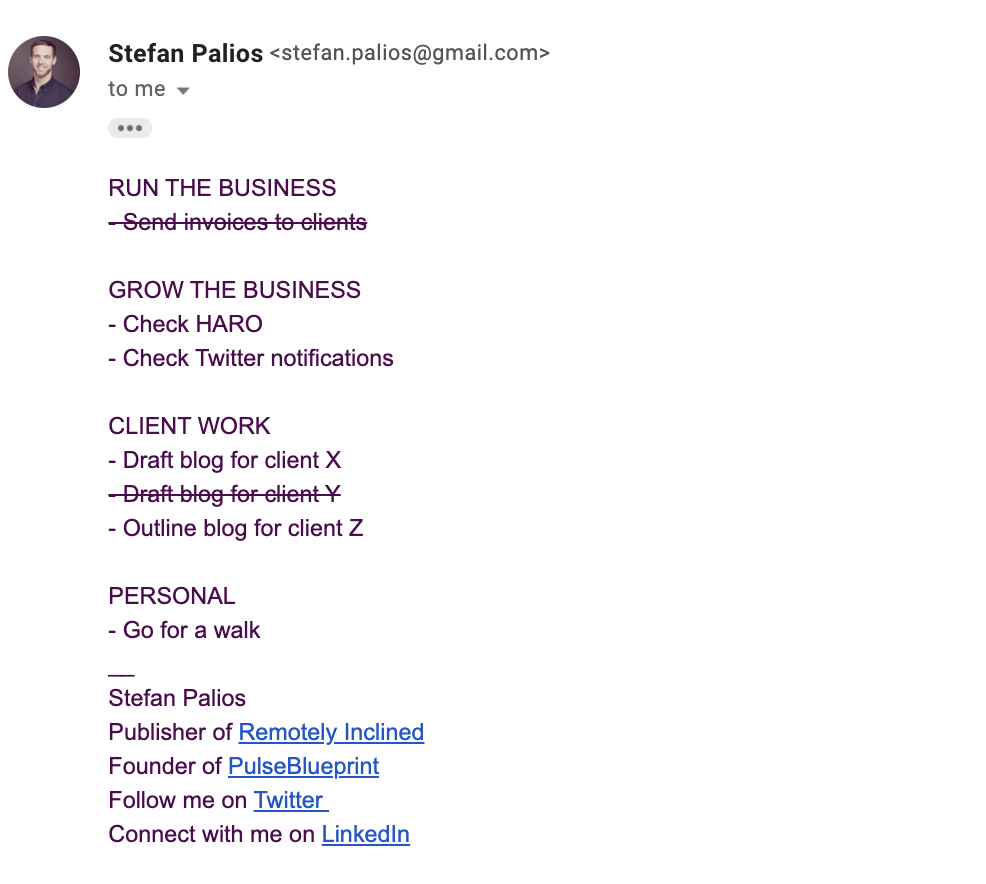Staying focused as a freelancer is tough. The only constant in your life is change. Even with ongoing clients, you’ll rarely have two identical days. Then you realize perhaps the most daunting thing of all: as a freelancer, you are every role. You’re the CEO, head of sales, head of delivery, head of accounts payable and receivable, and more. With all that, it’s no wonder that having to be a master of all trades is one of the top challenges freelancers face.
The solution is not to run through complicated programs or simply ‘hustle’ through it. Instead, freelancers should build a system that is so boring it forces you to be productive without even trying. I mean it. Boring works, if you let it.
Here’s the dull, simple, easy system I built for myself as a freelancer. It’s helped me be more productive, focus on key work each day, and improve the profitability of my business significantly.
Distractions galore
There are a lot of pitfalls to freelancing. But even when you overcome them (or avoid them), the distractions just keep coming.
In a given day, you may have to:
- Take a sales call.
- Work on a client project.
- Respond to a client email or help request.
- Post on social media.
- Write your own blog.
- Write a guest blog.
- Do an interview.
- Send an invoice.
- Deal with your banking.
- Deal with your website crashing.
- Try some conversion optimization tactics.
- … and more.
The problem is not the number of tasks. It’s that there’s no consistency. Your site doesn’t crash every day (hopefully). You likely won’t have a sales call every day (though it’s amazing if you do). Even if you have calls every day, each call is likely to require different preparation. You will probably have client work to do every day, but each client is slightly different.
So the challenge is finding a high level framework that encapsulates all possible tasks, so you can use the same system every day. That’s a tall order.
The risks and complicating factors
When distractions take hold, two bad things happen to you and your business:
- You have business risk.
- You have personal risk.
Business risk: poor quality and lack of delivery
Simply put: if you’re distracted, you’re getting less done. That could manifest as delivering lower quality work to clients, which could harm your business. Or it could mean you forget to send a sales follow up and lose a deal. It could mean a variety of things, but the net result is a risk to your business’ future success.
In one survey about the most common mistakes freelancers make, the top four were: sending late invoices, not signing a contract before starting work, not following up on late invoices, and not withholding money for taxes. All of these are simple administrative things that are easy to forget when you get distracted. Unfortunately, these are also some of the most critical parts of running a business.
Outside of the administrative issues, freelancers are also their own growth managers. You have to think about how to build your sales or inbound funnel. You have to handle your own freelance contracts (though you should get a lawyer to help as well). These tasks all fall by the wayside when we’re distracted.

Personal risk: burnout and limited creativity
As freelancers, it’s not just that you have every role in your business. You also are every role to yourself. As an employee, you might have colleagues or a boss looking out for you. Someone else can likely cover you for a few hours if you have a doctor’s appointment or an emergency. Even if you don’t have supportive colleagues, in most countries you’ll have legally protected sick days if you’re under the weather.
None of the protections given to employees exist for freelancers – we have to make our own schedules, and that also means looking out for our personal needs.
That means not only paying attention to worrying mental health signs, but also administering your own mental health first aid. From there, you have to cultivate your own growth mindset – you don’t have a manager nudging you along.
The solution: one email per day
When I started as a freelancer, I didn’t have a system in place. It sucked. My business hobbled along but wasn’t really going anywhere. When I developed this system, things started to change. Why? Because it’s simple. It’s one email a day. That’s it. I know it sounds weird, but it really works.
Step 1: Send yourself an email
Open up a new email draft each morning, addressing it to yourself. Write out four categories in all caps:
- RUN THE BUSINESS
- GROW THE BUSINESS
- CLIENT WORK
- PERSONAL

In each category, write out the tasks you must complete that day.
For example, you may need to send invoices for a client (“run the business”). Or you want to pitch a journalist from HARO (“grow the business”). In client work, write down anything you need to get done for clients that day – whether that’s a whole task (e.g. “Write a blog post for Client X”) or just a part of a bigger task (e.g. “Analyze SEO keywords for Client X to prep for content strategy”).
What’s important is to only put what you need to get done that day. Otherwise, this list becomes daunting.
 This was my real priorities email for Jan 29th, 2021. I just anonymized the client names.
This was my real priorities email for Jan 29th, 2021. I just anonymized the client names.
Note: you can do more than what’s in this list. This is about focusing on your key priorities. It helps you choose between tasks, it helps you refocus if you get distracted, and it helps you think about your days more consciously.
Over time, you might notice the same tasks popping up either daily or at regular intervals. For example, I check HARO every day to see if there’s a journalist I can pitch for a story. It’s one small task (takes about 5 minutes) but it ensures that I am doing just a bit of growth every day. It’s landed me features in American Express Magazine, Influecive, and more over the years.
Having the “growth” section also allowed me to carve out time to write my book, The 50 Laws of Freelancing. Because of this system, I was able to write the book in under three months – I wrote about that experience here.
Personal tasks are explicitly included here because freelancers need to manage their lives just like anyone else. I try to go for a walk every day, but some days that list may also include things like a dentist appointment. During the time I was doing a meditation challenge, I listed “Meditate” every day in my personal priorities list.
Step 2: Respond and cross out
This is the fun step, in my opinion. Every time you complete a task, respond to the email creating a thread. Except cross out the task you completed.
This process does three helpful things:
- It provides a visual aid to show you how much progress you’ve made each day.
- It provides an easy visual reference if you get distracted. Just open the email and see what’s left to do.
- Responding to the thread every time you complete a task keeps the email at the top of your inbox throughout the day, helping keep your priorities top of mind.

Power to the day
The reason why this system is so powerful is two-fold for helping you stay focused:
- The categories are timeless.
- The actions are daily.
Every business needs admin work done, growth tasks accomplished, and client/revenue-generating work done. Every freelancer, since we’re also humans, will have personal tasks to accomplish as well most days. This system ensures that nothing is forgotten – and that the categories never have to change. That alone provides a sense of consistency. Each day you know you will be running your business, growing your business, doing client work, and handling your personal life. No muss, no fuss. It is what it is.
But at the same time, each day looks different for a freelancer. You may have a ton of sales calls one day. Or you try for a no-meeting Mondays kind of vibe. Or something happens in your personal life that derails the day. These things happen. That’s why the system is updated each day with priorities for that day – and that’s it.
There is no weekly planner forcing you to think a week ahead. Sometimes, you just don’t know that information. However, when you do, you can easily bake that into tasks each day. For instance, if you know you have to make a weekly plan, then put “Make weekly plan” as a task on Monday. Put it in a category based on what the plan is for. If it’s an admin plan, it’s in the “Run” category. If it’s about sales or branding, it’s “Growth.” For client plans, “Client work.” And for your own life, it’s “Personal.” Again, no muss, no fuss.
As long as you focus on your priorities for each day, you’ll be able to focus more and quickly get back to work if you hit a distraction. This simple system not only provides structure for each day, but also gives you a visual mechanism to lean on.
The key to success is not about fancy programs, but things that remove the necessity for you to think it through. With this one email a day, it becomes a habit – get coffee, write email, then start work. You don’t have to think. And let’s be real: as a freelancer, any time we just get to do work instead of thinking about it is a major win.
Business & Finance Articles on Business 2 Community
(11)







